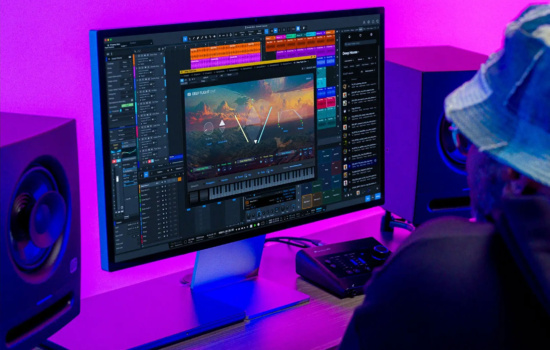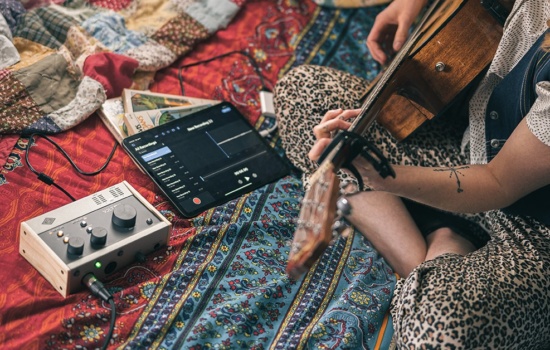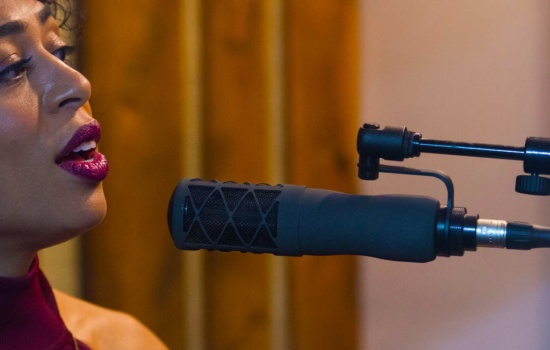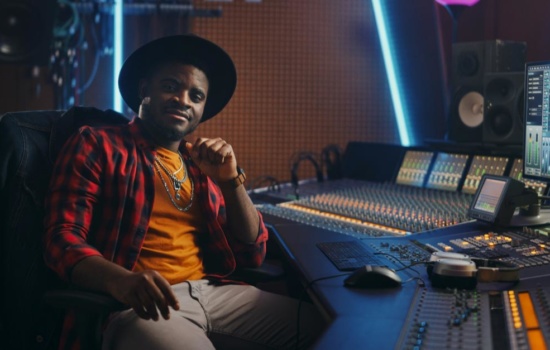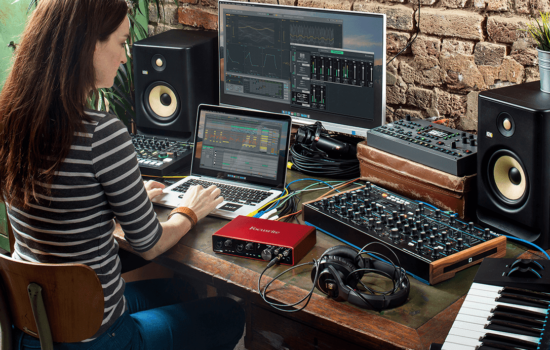A music producer is responsible for turning an unrecorded song into a professional recording that fans can listen to.
Music Career Finder
Survey Start
Music Production: A Comprehensive Guide to Techniques and Software
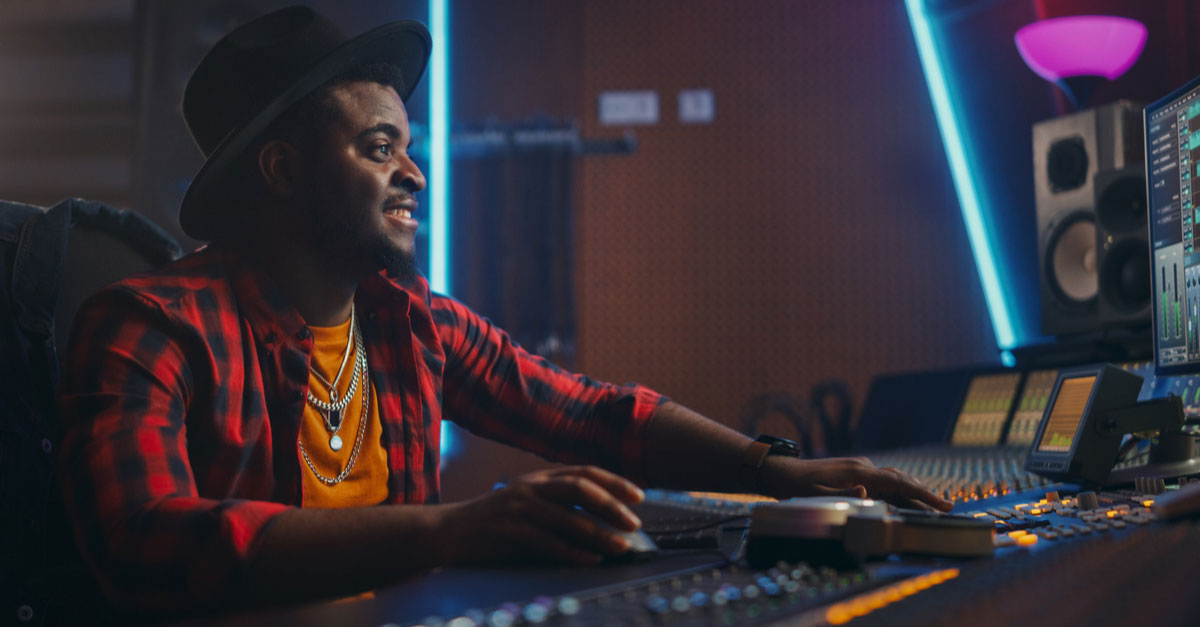
- A music producer is the driver of a song — they’re responsible for turning an unrecorded song into a professional recording that fans can listen to
- You’ll need to know how to use the basic music production software and equipment, like a digital audio workstation, audio interface, and MIDI controller
- It will benefit you to know how to play an instrument, how to write songs, and how to mix and master a track
- Producing music is all about creating music that causes an emotional reaction, so pay attention to how your production makes you feel
- Introduction
- What Does a Music Producer Do?
- Creative Influence
- Audio Engineering
- Doing What's Best for the Song
- It's All About the Feeling
- Music Production Equipment and Software You’ll Need
- Digital Audio Workstation (DAW)
- Computer
- Audio Interface
- Microphone(s)
- Headphones and Monitors
- MIDI Controller
- Cables, Stands, Pop Filter
- Skills & Knowledge You Need as a Music Producer
- Songwriting and Arrangement
- Know How To Play an Instrument (or Multiple)
- Learn About Your DAW, Plugins, and MIDI
- Audio Engineering
- Mixing
- Mastering
- People Skills
- 11 Steps To Start Producing Music
- 1. Study Other Songs
- 2. Get Your Equipment and Software
- 3. Set Up Your Equipment
- 4. Set Your Time Signature and BPM
- 5. Remake Other Songs
- 6. Start Recording
- 7. Re-Record
- 8. Edit
- 9. Ask Yourself: What Do I Feel?
- 10. Mix the Song (optional)
- 11. Master the Song (optional)
- Music Production In the Era of Artificial Intelligence
- Sources
- References
Music production is the process of creating a recording of a song.
That’s a somewhat vague definition, and that’s because it can involve many responsibilities and tasks, depending on what the song needs.
Music production can involve writing the song, composing and arranging the different instruments, recording all of the parts, editing the recorded parts, and even mixing and mastering the track.
So here’s a guide on music production for beginners…
What Does a Music Producer Do?
Creative Influence
The producer is often a creative and technical force behind a recording project, whether it’s for an artist or their own music.
They guide the entire process, from choosing which song(s) to record to arranging the instruments to coaching the artist to bring out their best performance.
Audio Engineering
Producers may also handle audio engineering tasks, like:
- Setting up recording sessions
- Positioning microphones
- Monitoring signals at the control board
- Using a digital audio workstation (DAW) to edit audio, sometimes in real-time
- Mixing and mastering a track
Doing What's Best for the Song
If a song were a car, they would be the driver.
Some producers specialize in certain genres, while others work in any style, but their main aim is always to do what’s best for the song(s). Not what would make them look the coolest. Not what any label thinks they should do. A good producer puts the music above all else.
And what’s best for the song is to make it make you and the listener feel something strongly.
It's All About the Feeling
Pharrell, Grammy-winning songwriter, producer, and artist, says “chords are coordinates…they take you to a place” where you feel something. And that’s what producing music is all about – making you and others feel something.
“[For me…] everything’s cataloged by and categorized by the feeling of it,” he said. “If I can’t see how I feel about it, then I don’t even know what it is. It’s just music.”
Grammy-nominated engineer, producer, and mixer Jason LaRocca told us the feeling of a song is “more important than anything else.” And what makes someone an “incredible” producer is that their subjective response to a song also resonates with a lot of people.
“…You don’t teach that to anybody, that’s just something you know,” he said.
Music Production Equipment and Software You’ll Need
To get started with music production, you’ll need the right equipment and software. So here’s your music production equipment list…
Digital Audio Workstation (DAW)
A digital audio workstation (DAW) is the piece of software you use to record and edit the music. It’s the heart of your production setup.
To make music production easier and more seamless, it’s important to choose the best DAW for your needs and learn everything you can about it.
Some of the best DAWs on the market include Pro Tools, Logic Pro, Reaper, and Cubase. But there’s a DAW for whatever kind of producer you want to be.
Computer
Your computer is the backbone of your studio. The two main types of computers that producers use are Apple or a PC. The type of computer you choose will depend on your DAW (some only work with certain types of computers), your budget, and whether you prefer Apple’s operating system or Microsoft’s.
Before you buy a computer, check the requirements of the DAW you want to use to make sure your device can handle the software.
Audio Interface
You plug instruments and microphones into an audio interface, which then connects to your computer. This allows you to record live instruments and vocals.
The best option for beginners is a USB interface because every computer has a USB slot. And these interfaces are powerful enough to get pro-level recordings.
Microphone(s)
Both a dynamic microphone and a large-diaphragm condenser microphone are ideal for recording live instruments.
Dynamic mics are usually durable and can handle a wide range of instruments, but they’re not as sensitive as condenser mics. On the other hand, condenser mics will capture more subtleties in your recording but are more expensive and not as durable as dynamic mics.
Headphones and Monitors
You will need headphones so you can record live instruments. Otherwise, the track playback will bleed into your recordings.
On top of a trusty pair of headphones, it’s a good idea to invest in studio monitors, especially if you’ll be mixing and mastering music.
MIDI Controller
A MIDI controller usually looks like a piano keyboard – some have the full 88 keys and some are little 25-key keyboards. They can also look like a drum pad.
Regardless, a MIDI controller lets you record and manipulate virtual instruments and sounds in your DAW. Having one opens you up to a world of instrumental possibilities.
Cables, Stands, Pop Filter
Don’t forget to get to buy an XLR cable for your microphones, mic stands, and a pop filter. You can often find a bundle that comes with all three of these items.
A pop filter is a mesh screen that goes between the singer’s mouth and the microphone. It helps prevent plosives, which is when a consonant produces a shot of air that hits the mic and creates a popping sound. You don’t want popping sounds in your recording.
Hey, what do you think about trying our new Music Career HelperMusic Career Helper really quick? It’s totally free and could help get your career moving fast! Give it a try. It’s totally free and you have nothing to lose.
Skills & Knowledge You Need as a Music Producer
Some people wonder if you need to get a music production degree. And the answer is, maybe.
According to Grammy-nominated producer Harvey Mason Jr. (Beyonce, John Legend, Ariana Grande), it all depends on your goals.
“It really depends where [the degree is] from and where you are in your progression as a producer,” he told us. “It’s really about learning how to get what’s in your head out of the speakers. Regardless, it really is a craft you have to work hard to master.”
Whether or not you have a degree, there are music production career opportunities if you’re willing to hustle.
Regardless, here are the essential skills you need to develop if you want to succeed as a music producer…
Songwriting and Arrangement
A strong understanding of songwriting and arrangement is crucial.
Producers often adapt songs to fit specific genres or artistic visions, deciding on instrumentation, form, and overall style. They may also create arrangements on the fly, making crucial decisions that shape the final product.
And the thing that determines a producer’s songwriting and arranging skills is their taste and love of music in general.
Know How To Play an Instrument (or Multiple)
People hire producers for their ideas, not necessarily their musical ability. Legendary producer Rick Rubin doesn’t play a single instrument or know how to work a soundboard, but people love his ideas.
However, Rubin is the exception, not the rule. Pretty much every working producer knows how to play an instrument, and most of them play multiple. Mason, Jr. said you at least need to know the role each instrument plays in a song.
“You need to know music and hopefully play an instrument,” he said. “You definitely should have an understanding of what different instruments can do and what they sound like. What mood or vibe do certain instruments or sounds evoke?”
Learn About Your DAW, Plugins, and MIDI
Mastering your DAW is essential. It’s where all your production work happens. Plugins and MIDI instruments are tools that enhance your creativity, letting you shape and modify sounds to fit your vision. So learning these tools will help you reduce the time spent trying to get the song to become a reality.
Grammy-nominated producer TOKiMONSTA (Anderson .Paak, Earthgang, Beck) emphasizes the importance of knowing the ins and outs of your DAW.
“As a producer, when you go into your DAW and you can find some part of it that no one else really knows, that sets you apart,” she said.
Audio Engineering
A solid grasp of audio engineering will help you navigate the technical aspects of recording, from mic placement to room acoustics to managing input levels.
You don’t have to be an expert, but the more you know, the smoother your production sessions will go and the better experience you and the artist will have making music.
Mixing
Mixing is where you balance all the instruments of your track to be cohesive with each other.
It involves adjusting gain levels and panning, and applying effects like EQ, compression, reverb, delay, and others to get every element of the song to sit well in your mix.
Here’s briefly what each of those effects does:
- EQ (Equalization): shapes the tonal balance of a sound by boosting or cutting specific frequencies
- Compression: reduces the dynamic range of a sound, making it more consistent in volume
- Reverb: simulates the sound of a space, adding a sense of depth and ambience
- Delay: creates echoes of a sound, repeating it over time
This is the stage where you turn raw recordings into something that sounds professional.
Mastering
Mastering is the final step in the production process (it could be considered part of the post-production process). It involves bouncing the final mix to one lossless audio file, like a WAV, and editing that file so it’s ready for distribution.
The main goal of mastering is to make the track sound consistent across different playback systems. The most noticeable difference between an unmastered track and a mastered track is that it’s louder.
As a producer, you may not always be mastering tracks. Many times, you would send the final mix to a mastering engineer to finish the job. But even if you’re not going to master a track, it’s still good to know what mastering is.
People Skills
This skill is listed last, but it may be the most important, mainly if you’ll be producing music for other artists.
Mason, Jr. told us it’s “a very important part of being a producer.”
“You need to be able to recognize what makes people tick and how to get the very best performance out of them,” he said.
Pharrell said his job as a producer for other artists is to be “like a mirror for people.”
“I try to show them sides of themselves that they don’t ever use,” he said. “It’s like when people take selfies, they only use one side all the time. So I’m the guy that’s like, ‘Hey, you know, God made another side. It’s very interesting, you should try it.’”
Legendary producer Rick Rubin tries to make the artist feel “completely vulnerable and feel completely free to be themselves a hundred percent.”
“I spend time with the artist and see where they’re at,” he said. “…I try to imagine what them at their best is and then try to set up whatever situations we can to allow that to happen.”
Furthermore, people skills come in handy whether you’re guiding an artist or collaborating with your peers.
Max Martin, a Grammy-winning songwriter and producer, says you need to collaborate with songwriters, artists, and engineers who have skills you don’t.
“You need better people around you to evolve,” he said.
11 Steps To Start Producing Music
Just like learning any new skill, there will be a learning curve with music production. But once you understand the basics, it gets easier and easier.
In terms of making a living as a music producer, it’s definitely doable, but it will take hustle. Whatever the case, if you love producing music, that will drive you to succeed.
Let’s look at practical steps you can take right now to start producing music…
1. Study Other Songs
The best way to learn music production is to learn from the best producers. And you can do that by listening closely to all the parts of a song and taking notes.
“A beginner can start by listening to a ton of music and then sit down and figure out what went into making it,” Mason, Jr. said. “How and why does it sound the way that it does?”
LaRocca told us that when he first started producing and mixing songs, he would “constantly” A/B test his tracks against the professionals’ songs. He said that’s the way to get better.
2. Get Your Equipment and Software
Before you start producing music, you need some software and equipment. As a reminder, the things you would ideally have include a DAW, computer, audio interface, microphone(s), headphones and monitors, MIDI controller, and mic cables and mic stands.
You can get all of this recording equipment for under $1,000 (not including the computer), which is actually very affordable for what you’re getting.
Now, if you don’t have the budget for all this equipment, you can start by producing music with an online DAW like Sountrap or BandLab. Check out our full guide on making music online.
3. Set Up Your Equipment
Each device will come with its own setup instructions and will probably involve downloading a corresponding piece of software, like with the audio interface and the MIDI controller. So be prepared for that.
Once you’ve followed those instructions, here’s what you need to do to make sure you’re ready to start producing music:
- Plug the audio interface into your computer
- Plug the microphone (via the XLR cable) into the interface (if the mic requires phantom power, make sure the phantom power setting on the interface is turned on)
- Put the microphone in the mic stand
- For vocals: place the pop filter 3-4 finger widths away from your the mic and keep the singer’s mouth an equal distance away from the pop filter
- For acoustic guitar: place the mic 6-8 inches away from the guitar at a 45-degree angle, aimed between the 12th fret and the end of the fretboard
- Make sure your MIDI controller is plugged into your computer (usually these are USB devices)
4. Set Your Time Signature and BPM
Before you hit Record, you need to set the beats per minute (BPM). This controls the click track AKA the metronome – it helps you stay on time (think “1, 2, 3, 4”). If you record something and then change the BPM, it will distort and warp the audio you just recorded. So set the BPM first.
Also before you record, you’ll need to choose the time signature of the song. The most common options are 4/4 and 3/4.
- 4/4 time signature: there are four beats within one measure (AKA a set of beats). So the click track would count 1, 2, 3, 4, then repeat it indefinitely at the same tempo.
- 3/4 time signature: there are three beats within one measure (AKA a set of beats). So the click track would count 1, 2, 3, then repeat it indefinitely at the same tempo.
5. Remake Other Songs
The best way to learn music production is to learn other people’s songs. So if you’re new to producing music, set out to recreate your favorite song.
Drop another artist’s song into your DAW, then borrow ideas from it.
This can look like:
- Using a similar chord progression
- Using similar sounding effects
- Using the same BPM
- Starting with the first two notes of the song’s melody but writing the rest from there
- Creating a similar beat
Obviously, you should not plagiarize another creator’s work. But you can use another song as a starting point to create something new.
6. Start Recording
If you’ve never recorded music before, this may feel overwhelming. But just hit Record and give it a go. You’ll make mistakes, but the beauty of technology is you can re-record and edit takes.
The key is to just show up and be ready to capture whatever happens, as Grammy award-winning producer Don Was says.
“You set up the room and you hope that lightning strikes,” he said. “And the best that experience and knowledge can bring you is that when it strikes, you make sure you capture it and that you know what to do with it.”
7. Re-Record
You can record as many takes as you want, so don’t worry if you don’t nail the performance on the first few tries. DAWs let you record new takes while keeping the previous takes, and then you can even compile takes together (AKA “comping”).
Paul McCartney recorded 32 takes of The Beatles’ “Blackbird” before he got the take he wanted. And 11 of those takes were complete from beginning to end.
Be patient with yourself and re-record.
8. Edit
Once you’ve recorded all the parts of your song, it’s time to do some editing. Editing in this context has a lot of crossover with mixing (which we’ll talk about below), but it can include:
- Choosing the best take of each instrument
- Comping takes together (ex. choosing the best parts from multiple different lead vocal takes to make one, really good lead vocal take)
- Tuning vocals
- Volume adjustment of the different instruments
- Panning the different instruments
Out of all the parts of producing a song, editing might take the longest.p
9. Ask Yourself: What Do I Feel?
Producing music is all about making music that makes you feel something. And there are three tests you can put your song through to help you see if your song will be impactful.
- The Feel Test
As you produce your song, it should make you smile, put a lump in your throat, make you dance in your seat – anything that makes you feel an emotion. If it doesn’t, the song probably needs more work.
Legendary producer, composer, and musician Quincy Jones agrees.
“You make something that you love, man, and makes you get goosebumps,” he said. “That’s what I do and I don’t care if anybody else gets them.”
- The Wait Test
After the song is produced, set it aside for a day or week or month. When you come back to it, pay attention to see if it still makes you feel a strong emotional response. If it does, it’s probably ready to be finished.
- The Human Test
Great art resonates with people because it captures the human experience. So to see if your song will connect with people, play it for someone who you know has good musical taste.
If possible, sit with them in the room as they listen, and watch for their honest reaction. Their response will give you an idea of whether your song is ready to be shared with the world.
10. Mix the Song (optional)
Music production and mixing have a lot of crossover, which is why many producers also mix and many mix engineers also produce.
Mixing involves volume and panning adjustments, which the producer may do some of. And certain mixing choices, like adding reverb or delay on certain parts, may be made by the producer.
Learning how to mix music can give you more creative control over the final sound, but it’s best to first deeply understand how to produce music before developing a skill like mixing.
Sites like Mix With The Masters and MasterClass can walk you through the basics.
11. Master the Song (optional)
You can definitely master a song you’ve produced and mixed. So many producers choose to do this.
But on the other hand, it may be a good idea to get another pair of ears on your project by hiring a mastering engineer. You’ve heard the song probably hundreds of times, so you’re no longer objective. And the mastering engineer may bring something to the song that elevates it that you wouldn’t have thought of.
Again, mastering is a skill you can learn, but you should get really good at producing music first.
Music Production In the Era of Artificial Intelligence
When Artificial Intelligence can create music on its own, what’s the point of learning music production?
First of all, producing music is fun and rewarding. So why let a robot have all the fun?
Secondly, producing music on your own means you’re in total control. You can make precise production choices — and as of right now, you can do that faster and with better results than trying to prompt an AI bot to do it.
LaRocca told us the story of the time he was mixing a song for a TV show. It involved a “very big music producer,” yet it was found to have AI elements at the creative level. So the production team had to re-produce it and LaRocca had to re-mix it.
But during the second round, they found the song still had elements of AI in the production.
Using AI in your production is a problem because AI is basically a copy of something else or multiple other things.
So you have to be very careful about using AI elements in your songs, especially because the laws on it are still unclear.
“If you can’t use [something you’ve created with AI], I don’t know what good it is,” LaRocca said. “It has to be something that works for you and not in place of you.”
He did say that AI can be great when it’s “working alongside you creatively.” And he pointed out that there are several AI-driven plugins and software that can “fill in the gaps” of what humans can’t do, or things that it can do faster than us.
So there is a place for AI, but it’s in the passenger seat helping us navigate, not behind the wheel.
Sources
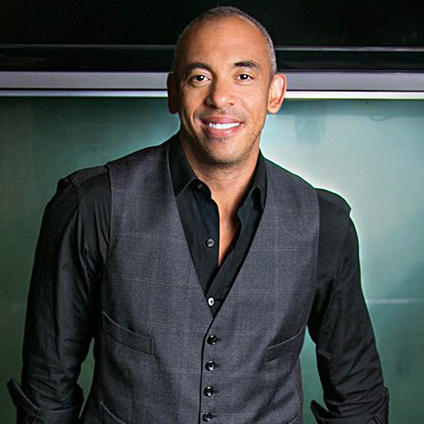
Harvey Mason jr.
Harvey Mason jr. has not only penned and produced songs for industry legends like Aretha Franklin, Michael Jackson, Whitney Houston, Mariah Carey, and Elton John, but also for today’s superstars including Justin Bieber, Beyonce, John Legend, Ariana Grande, Justin Timberlake, and Chris Brown. In addition, he has compiled an impressive list of film and TV music credits including writing/producing the music for Jesus Christ Superstar Live!, Sing, The Wiz Live!, Jingle Jangle: A Christmas Journey, Zoey’s Extraordinary Playlist, Shrek, Straight Outta Compton, all three Pitch Perfect films, Dreamgirls, Get On Up, and Over the Moon, to name a few.
Harvey was born in Boston, Massachusetts where his parents attended the prestigious Berklee College of Music. His father, Harvey Mason, Sr., is a noted jazz drummer and founding member of the group Fourplay. Mason jr. grew up in Los Angeles where he tagged along to his father’s recording sessions with the likes of Quincy Jones, Carole King, The Brothers Johnson, and Herbie Hancock. Harvey wrote and placed his first song, “Love Makes It Better” for Grover Washington, Jr. at the age of eight. Besides being a gifted musician, Harvey was also a skilled athlete. After being named a high school All American, he attended the University of Arizona on a basketball scholarship and played in the 1988 Final Four with teammates Kenny Lofton, Sean Elliott, and Steve Kerr.
In addition to his work on the music side, Harvey leveraged his experiences in film and TV and expanded his business to include a new content production division. He produced and executive produced his first feature film project, the Lebron James movie More than a Game for Lionsgate. Most recently, Harvey is producing the highly anticipated biopic for MGM, Respect starring Jennifer Hudson as Aretha Franklin. With three more projects in development at studios and slated to come in 2021, Harvey has an exciting future in the TV/film space.
Ahead of the curve, Harvey started to expand his company into Asia back in 2012, which included business ventures in both China and Korea. As one of the first western companies into these new “pop music” markets, Harvey has built a reputation as one of the “go to” hit makers. He has worked with top Korean supergroups such as EXO, NCT 127, Girls Generation, and Red Velvet as well as many top Chinese artists such as Jane Zhang and Jackson Yee.
Harvey now also proudly serves as the President and CEO of the Recording Academy. He is also a member of the Board of Trustees for his Alma mater, the University of Arizona. He also serves on the board of the Los Angeles Sports and Entertainment Commission. Harvey received the Spirit of Excellence Award in 2012 by the T.J. Martell Foundation for his philanthropic efforts and has served on its board. Harvey donates his time and resources to several charitable organizations including MusicCares Foundation, Ronald McDonald House, the American Cancer Society, and Los Angeles Children’s Hospital.
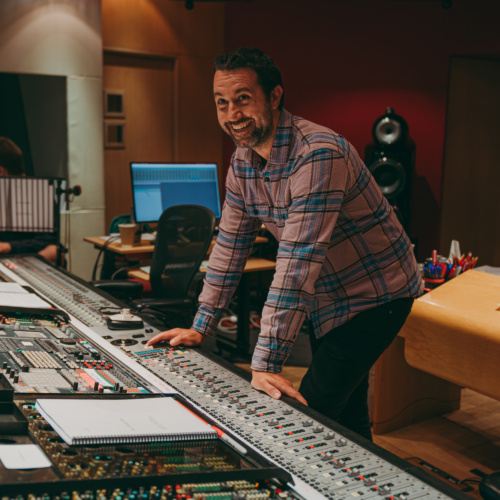
Jason LaRocca
Jason LaRocca, a Grammy-nominated engineer and mixer, is also known as the former singer/guitarist of the acclaimed punk band The Briggs. By the time he was eighteen, the Los Angeles native was already touring the world as a musician, while simultaneously establishing himself as a producer and recording engineer.
Jason’s extensive career spans both film and video game music. He has worked with major movie studios, recording and mixing music for blockbuster films like Bad Boys for Life, Paddington, Aquaman, The Flash, and the Oscar-winning documentary Icarus. His work in the gaming world includes mixing music for popular titles like Fortnite, God of War: Ragnarök, Call of Duty: Black Ops Cold War, Assassin’s Creed Valhalla, among others. True to his multifaceted approach, Jason often goes beyond engineering, producing scores and creating sound design and instrumentation for many of his projects.
In television, Jason’s expertise extends to score recording and mixing for a number of high-profile shows. His TV credits include The Lord of the Rings: The Rings of Power, Little Fires Everywhere, Justified: City Primeval, Fellow Travelers, Locke & Key, The Offer, Black Mirror, and Venom: the Last Dance.
Jason has also worked with top recording artists, including Jay-Z, CeeLo Green, Fiona Apple, ScHoolboy Q, and Serj Tankian of System of a Down, lending his engineering and mixing talents to some of the biggest names in music.
In 2023, Jason earned his first two Grammy nominations — one for his mixing work on the cast album of the hit Broadway musical Sweeney Todd: The Demon Barber of Fleet Street and another for Best Video Game Score for God of War: Ragnarök.
Photo credit: Kevin Matley
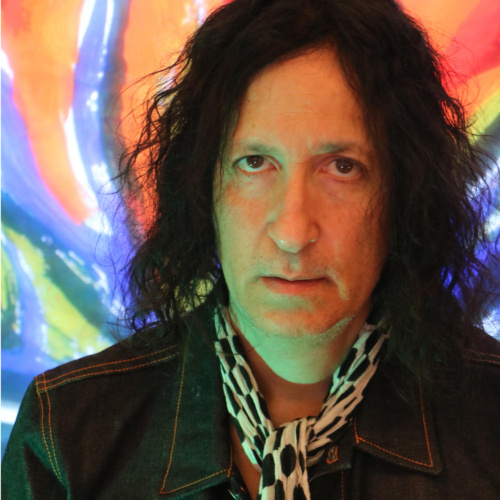
Gordon Raphael
Gordon Raphael, his mom and grandma Minnie knew that big things were possible when he won a Red Cross sponsored art contest at age six, whilst still in first grade in Pennsylvania. The awar winning painting which was sent around the world, featured a bird house with an entrance and exit, just like he had observed at his school.
At the age of 13, Gordon quit his traditional piano lessons to join his first (of 33 different) roc roll bands. Stepping onstage and performing at Jr High School dances at earsplitting volumes “sealed the deal” and for the rest of his life Gordon dedicated his time and energies to music; composing, performing, recording and producing during the last 5 decades.
With Sky Cries Mary during the Seattle grunge explosion, great signs of success and satisfaction appeared with several valuable recording contracts and a publishing deal in Beverly Hills (World Domination Records, Warner Bros Records and Windswept Pacific Publishing Toward the end of this great time for Seattle bands, he moved with his new band partner Ann Hadlock to New York City to continue his music career and gained a reputation in the East Village as a studio owner and producer-for-hire.
Playing locals shows with his group, Absinthee was very exciting— but when he discovered local NYC band, The Strokes and produced their first EP and subsequent two albums, things reall took off. Then came the good fortune to meet and produce Regina Spektor for her brilliant Sovie Kitsch album, which was eventually released by Seymour Stein (The Ramones, Madonna) on his SIRE Records label.
Gordon Raphael relocated to London then Berlin, and finally settled in West Yorkshire, UK in th pursuit of more and more interesting musical opportunities. By now Gordon has recorded 20 albums of his own music, produced over 200 bands, worldwide and as of 2022, became a author of a book titled, The World Is Going To Love This (Up From The Basement With The Strokes), via Wordville Press in London.
Believing that art and music are some of the most precious and worthwhile of all human activities, Gordon has championed young musicians and others drawn to creative callings. By nurturing the imagination, and protecting expressive tendencies towards originality and highly individualistic works, he has been cheerfully welcomed as a lecturer, speaker and music producer.
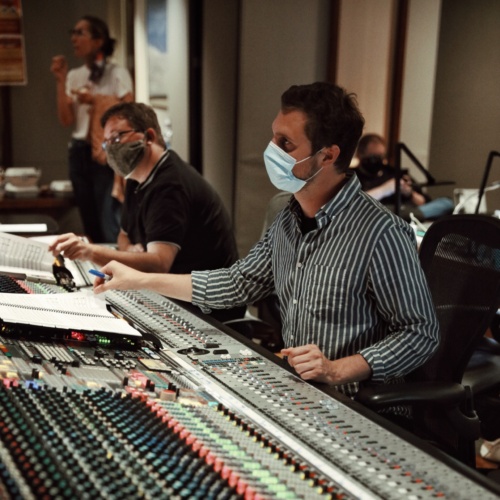
Thor Fienberg
Thor Fienberg is an Emmy-winning recording engineer and mixer working primarily in the film and television scoring world.
Before becoming an Emmy and CAS award-winning mixer for his work on the Apple TV+ series Master’s of the Air, he was producing and songwriting with a publishing deal under Producer John Shanks. He started working at Blake Neely’s Cow on the Wall Studio in 2016 and there he found a passion for engineering and mixing from working with top-tier engineers, such as Jason LaRocca, Greg Hayes, and Scott Michael Smith.
His works range from albums to video games and film works. Credits include: Minecraft Legends, Loki, It Ends with Us, and the upcoming Hulu series Chad Powers.
References
- 1AirGigs. " Production Insights - Quincy Jones, Rick Rubin, Sylvia Massy, Daniel Lanois & More ". YouTube. published: Sept 24, 2020. retrieved on: Nov 6, 2024
